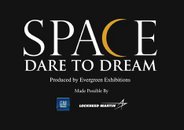Wednesday, July 25, 2007
Classic Films from Outer Space!: Forbidden Planet
A rescue team is dispatched to investigate the disappearance of a colony on a remote planet. Upon arrival, they discover the only survivors are Dr. Morbius, his daughter and their robot servant, who have somehow eluded the hideous monster that roams the planet. Starring Walter Pidgeon, Leslie Nielsen, Anne Francis and Robby the Robot.
1956, 98 minutes, Rated G.
No registration required.
Children under 12 must be accompanied by an adult.
Exhibit Profile: Lunar Sample no. 60015,85
Tuesday, July 10, 2007
Around the world in 90 minutes
July 10, 2007
ELGIN -- The biggest insider secret about space travel, according to one seasoned astronaut, is that it's actually quite peaceful. Your ears don't even pop during take off.
"It's all very pleasant," said Dr. Janice Voss, who calls Rockford home.

(Michael Smart/Staff Photographer)
Being boosted into an infinite unknown by engines that create a combined maximum thrust of more than 1.2 million pounds wouldn't calm most people. But, traveling through space is not as challenging as popular films The Right Stuff and Apollo 13 suggest, said Voss, a crew member in five space missions since 1993 who has orbited the Earth 779 times, lived in space for 49 days and traveled 18.8 million miles.
"The body is really happy in space," Voss said. And that is a problem when astronauts come back down to Earth. "Stop torturing me with gravity," is the body's plea, she said.
Of course, she said, Mercury and Apollo astronauts either were the first in space or were shooting for the moon, both perhaps more taxing than the research missions Voss has flown. She's never done a space walk, as her missions have mostly focused on gathering data and creating a three-dimensional map of the Earth.
"The only planet I've been to is this one," she told dozens of children in grades 2-6 enrolled in Hillcrest Elementary's summer school program.
In the school's humid gymnasium Monday she showed the youths film footage of her most recent space mission and answered their many questions.
In February 2000, during Voss' last mission, she and five other astronauts aboard Space Shuttle Endeavour, about the size of a Boeing 737, mapped with radar more than 47 million miles of our planet's land surface.
Over 11 days they slept in sleeping bags in tight, dark cubicles, and yes, they did float as they slept.
"It's way better than laying in a bed." Not so great, at least for the first two days, is eating.
"It actually doesn't stay down," she said of swallowed food. "It feels like you're going to be sick." After a time the urge to upchuck goes away, as the body learns to fight weightlessness and keep food down.
While training for a space mission, an astronaut can be told what to expect, but there are some details one has to figure out alone.
"Like the best way to wear your hair, something silly like that," Voss said. "Your taste buds change. They change more than you expected."
Food tastes either too sweet or too bland. Astronauts crave spicy food, with shrimp cocktail being the most popular menu item on the shuttle, she said.
"Things like how to run an experiment you can train for." But finding she didn't like chocolate in space is a surprise Voss, a self-proclaimed chocoholic, wasn't expecting.
Voss became interested in space in sixth grade after reading the science fiction classic A Wrinkle in Time, by Madeleine L'Engle. She encouraged the audience to read and, of course, to develop an interest in space -- and one young man asked what it takes to be an astronaut.
You've got to be good at math and science, she said, and have at least a bachelor's degree. Being a team player and an eloquent public speaker are pluses. And, a track record of enjoying dangerous hobbies -- such as scuba diving, mountain climbing and piloting aircraft -- gives you a leg up. Quite the savvy audience, another youth asked, "How much money do you make?" to which Voss replied that a starting salary for many astronauts is $100,000 a year.
But, NASA training and education may not be necessary for a person to travel to space. Voss is an advocate of commercial space travel, as long as it is carried out in a safe manner. Private companies can invest in and launch commercial space flights, which must be overseen by a governing body -- but not NASA, she said.
"We're a research agency. We have no skills and staff to do oversight."
Everyone lucky enough to see from space the Earth at night, big city lights twinkling, should. Voss said there's also Mount Fuji, the shadows cast by the Great Pyramids, and wind-carved patterns in the sands of Africa.
"You guys are young enough that when you grow up you can all go to space," she told the boys and girls.
Monday, July 2, 2007
Meet a real working astronaut
Veteran of five space flights, Dr. Voss, who has traveled 18.8 million miles in outer space, lands in Elgin for the evening. In her current position as Science Director of NASA’s Kepler Spacecraft Research Center, she is looking for Earth-size planets in other solar systems.
You must register to reserve a seat. Doors open at 6:30 p.m.
For more information call the Information Desk, 847-429-4680.


